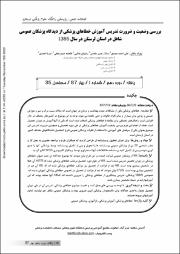| dc.contributor.author | Delfan, bahram | en_US |
| dc.contributor.author | Mosadegh, ali ahmad | en_US |
| dc.contributor.author | Nasir Moghadas, salar | en_US |
| dc.contributor.author | Batebi, rezvan | en_US |
| dc.contributor.author | Heidar Najafi, fatemeh | en_US |
| dc.contributor.author | Ahmadi, maria | en_US |
| dc.date.accessioned | 1399-08-21T21:44:55Z | fa_IR |
| dc.date.accessioned | 2020-11-11T21:44:56Z | |
| dc.date.available | 1399-08-21T21:44:55Z | fa_IR |
| dc.date.available | 2020-11-11T21:44:56Z | |
| dc.date.issued | 2008-04-01 | en_US |
| dc.date.issued | 1387-01-13 | fa_IR |
| dc.identifier.citation | Delfan, bahram, Mosadegh, ali ahmad, Nasir Moghadas, salar, Batebi, rezvan, Heidar Najafi, fatemeh, Ahmadi, maria. (2008). Study of medical errors status and its necessity of education from view point of Lorestan general practitioners. scientific magazine yafte, 10(1), 19-22. | en_US |
| dc.identifier.issn | 1563-0773 | |
| dc.identifier.uri | http://yafte.lums.ac.ir/article-1-65-en.html | |
| dc.identifier.uri | https://iranjournals.nlai.ir/handle/123456789/483356 | |
| dc.description.abstract | Abstract Background: Medical errors are among the main problems of health and treatment in the world which are responsible for mortality and psychophysical complications in patients, families, and even in the society each year. Medical errors have been increasingly taken into consideration in different countries. Different strategies have been explored to prevent medical errors, one of which is undergraduates education. The aime of this research is to study the current status and the necessity of medical errors education as one of the curricula from viewpoint of general practitioners in Lorestan province graduated from different universities. Materials and methods: A questionnaire was designed and distributed among 200 GPs in Lorestan province to be completed, then data were analyzed using SPSS software. Results: The results of the survey indicated that 90% of the GPs have not been taught any courses entitled medical error prevention. Moreover, 64% had committed medical errors before graduation, out of which 47.5% had been diagnostic errors. Additionally, 60% has committed medical errors after graduation, out of which 51% has been errors in disease diagnosis. 72.5% of them stated that have not taken any education about medical errors after graduation, 88.5% considered medical error prevention education as essential, and 40% believed that the education have to be restricted to diagnostic errors. Conclusion: Regarding the results of the present study and the importance of the topic, teaching medical error prevention as separate credits is highly recommended for medical students, as well as GPs need to be taught related education. | en_US |
| dc.format.extent | 137 | |
| dc.format.mimetype | application/pdf | |
| dc.language | English | |
| dc.language.iso | en_US | |
| dc.relation.ispartof | scientific magazine yafte | en_US |
| dc.relation.ispartof | مجله علمی پژوهشی یافته | fa_IR |
| dc.subject | Medical errors | en_US |
| dc.subject | Medical education | en_US |
| dc.subject | Re-education | en_US |
| dc.subject | General practitioners | en_US |
| dc.title | Study of medical errors status and its necessity of education from view point of Lorestan general practitioners | en_US |
| dc.type | Text | en_US |
| dc.type | Research | en_US |
| dc.citation.volume | 10 | |
| dc.citation.issue | 1 | |
| dc.citation.spage | 19 | |
| dc.citation.epage | 22 | |





